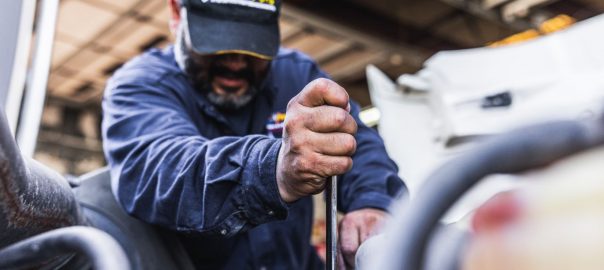Introduction
The steering system is a critical component in heavy trucks, responsible for maintaining the vehicle’s stability and control on the road. When problems arise, it is essential to diagnose and repair them promptly to ensure the safety and efficiency of your truck. This article will delve into the steps for accurately diagnosing and repairing steering system problems in heavy trucks.
Common Steering System Issues in Heavy Trucks
- Loose or Worn Steering Components: Over time, various steering system parts can wear out or become loose, affecting the truck’s handling and performance. Common culprits include tie rod ends, ball joints, and pitman arms.
- Power Steering Fluid Leaks: Leaking power steering fluid can lead to a lack of steering assistance, making it difficult to maneuver the truck. The issue may stem from damaged hoses, seals, or the power steering pump.
- Poor Steering Response: If your truck’s steering feels sluggish or unresponsive, it may be due to worn components, low power steering fluid levels, or issues with the steering gearbox.
- Steering Wheel Vibration: Excessive vibration in the steering wheel can result from issues such as imbalanced tires, a damaged steering column, or worn suspension components.
Diagnosing Steering System Problems
To accurately diagnose steering system problems in heavy trucks, follow these steps:
- Visual Inspection: Start by examining the steering components for signs of wear, damage, or leaks. Check the power steering fluid level and condition, and look for any obvious issues, such as loose or damaged parts.
- Test Drive: Take the truck for a test drive to assess its handling and steering response. Pay close attention to any unusual noises, vibrations, or changes in steering feel.
- Diagnostic Tools: Utilize diagnostic tools, such as a steering angle sensor tester or a power steering pressure gauge, to pinpoint specific issues within the system.
- Consult a Professional: If you are unable to identify the problem or if the issue is complex, consult a professional mechanic with experience in heavy truck steering systems.
Repairing Steering System Problems
Once you have identified the issue, follow these steps to repair the steering system:
- Replace Worn or Damaged Components: Inspect and replace any worn or damaged parts, such as tie rod ends, ball joints, or pitman arms.
- Address Power Steering Fluid Leaks: Repair or replace any leaking hoses, seals, or components, and refill the power steering fluid as needed.
- Adjust or Replace the Steering Gearbox: If the steering gearbox is the source of the problem, adjust or replace it to restore proper steering response.
- Balance Tires and Inspect Suspension Components: To address steering wheel vibration, balance the tires and inspect the suspension components for wear or damage.
- Perform a Wheel Alignment: After repairing the steering system, perform a wheel alignment to ensure the truck handles correctly and to prevent uneven tire wear.
Preventive Maintenance for Heavy Truck Steering Systems
To extend the life of your truck’s steering system and reduce the risk of future problems, consider implementing these preventive maintenance measures:
- Regularly Inspect and Service Components: Perform routine inspections and service of the steering system, including checking for worn or damaged parts and addressing any issues promptly.
- Maintain Proper Power Steering Fluid Levels: Regularly check and maintain the appropriate power steering fluid level to ensure smooth steering operation.
- Perform Periodic Wheel Alignments: Schedule periodic wheel alignments to prevent uneven tire wear and maintain optimal handling.
- Rotate and Balance Tires: Regularly rotate and balance your truck’s tires to promote even wear and minimize steering wheel vibration.
- Inspect Suspension Components: Routinely inspect your truck’s suspension components, such as shock absorbers, leaf springs, and bushings, for signs of wear or damage. Replace or repair these components to maintain a smooth and stable ride.
- Lubricate Steering Components: To reduce friction and wear, apply grease to the steering components, such as tie rod ends and ball joints. This will help prolong the life of these parts and maintain optimal steering performance.
By following these preventive maintenance measures, you can keep your heavy truck’s steering system in top condition and reduce the likelihood of problems arising.
Conclusion
Steering system problems in heavy trucks can lead to compromised handling, performance, and safety. By properly diagnosing and repairing these issues, and you can ensure the longevity of your truck’s steering system and maintain its optimal performance. Additionally, implementing regular preventive maintenance practices can further extend the life of your steering components and minimize the risk of future issues.If you need heavy truck repair services or are looking for trailer repair Las Vegas, we’re here to help.
